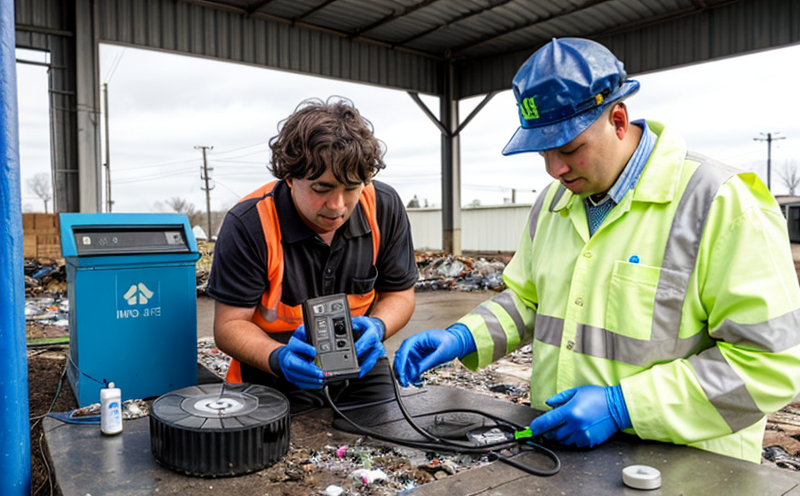EPA SW-846 Method 1311 TCLP for Electronic Waste
The EPA SW-846 Method 1311 Toxicity Characteristic Leaching Procedure (TCLP) is a critical analytical technique used to determine the leachate toxicity of solid waste materials, including electronic waste. This method assesses whether hazardous constituents are released from the waste under simulated conditions that mimic those found in landfills or other disposal environments.
The primary goal of this testing procedure is to identify and quantify any metals or other toxic substances that may leach into the surrounding environment if the waste were to be improperly disposed. The results help regulatory agencies make informed decisions regarding proper disposal methods, recycling practices, and compliance with environmental regulations such as RCRA (Resource Conservation and Recovery Act).
The EPA SW-846 Method 1311 is widely recognized for its stringent protocols designed to ensure accurate and consistent measurements of leachable metals. This method involves placing the waste sample in a specially prepared leachate solution, incubating it under controlled conditions, and then analyzing the resulting leachate using atomic absorption spectroscopy (AAS) or other suitable analytical techniques.
This testing procedure is especially relevant for electronic waste because many components of these devices contain hazardous materials like lead, mercury, cadmium, and hexavalent chromium. Properly conducted, this method ensures that recycled electronics do not contribute to environmental contamination through leaching processes during disposal or recycling operations.
The importance of this test cannot be overstated in today’s world where increasing amounts of electronic waste are generated annually. By accurately assessing the potential for hazardous material release, stakeholders can implement effective strategies aimed at minimizing risks associated with improper handling and disposal.
At Eurolab, we offer comprehensive services to assist clients in complying with this essential regulation. Our experienced team uses state-of-the-art equipment and follows strict procedures to ensure accurate results every time. With our expertise and commitment to quality assurance, you can rest assured that your electronic waste will be tested according to the highest standards.
Applied Standards
| Standard | Description |
|---|---|
| EPA SW-846 Method 1311 | This method specifies the procedure for determining the toxicity characteristic leachate of solid waste. It involves placing a representative quantity of the waste in a container with distilled water, shaking it vigorously to simulate leaching conditions, and then analyzing the leachate. |
| ASTM D5338-19 | This standard provides additional details on the preparation of leachate solutions for various types of waste materials. It complements EPA SW-846 Method 1311 by offering more precise guidelines based on material composition. |
Eurolab Advantages
Our laboratory offers unparalleled expertise in conducting EPA SW-846 Method 1311 TCLP testing for electronic waste. Here are some of the key advantages:
- Accurate Results: Our state-of-the-art equipment and rigorous quality control measures ensure precise and reliable results.
- Certified Personnel: Our team consists of highly trained professionals with extensive experience in performing this type of analysis.
- Comprehensive Reporting: We provide detailed reports that include all relevant data along with interpretative comments to help you understand the implications of your test results.
- Fast Turnaround Times: Thanks to our efficient processes, we can deliver timely results without compromising accuracy or thoroughness.
- Clients’ Satisfaction: Our commitment to excellence has earned us a reputation for providing high-quality services that exceed expectations.
Choose Eurolab for all your electronic waste testing needs. Let our expertise and dedication work for you!
Use Cases and Application Examples
| Use Case | Description |
|---|---|
| Recycling Facilities Compliance | Ensure that electronic waste being recycled does not contain hazardous materials that could contaminate the environment. |
| Manufacturers’ Environmental Impact Assessment | Evaluate new products or processes to minimize environmental impact by identifying potential leachable metals early in development stages. |
| Regulatory Compliance for Waste Disposal | Demonstrate adherence to regulatory requirements when disposing of electronic waste through landfills or other means. |
| R&D for New Recycling Technologies | Develop and optimize new methods for safely recycling electronic components without releasing harmful substances into the environment. |
| Third-Party Audits & Certifications | Support third-party audits or certification programs requiring proof of compliance with EPA regulations. |
The EPA SW-846 Method 1311 TCLP is an essential tool for anyone involved in the electronic waste industry, whether they are responsible for recycling operations, product development, regulatory compliance, or environmental impact assessments. By leveraging this testing method effectively, stakeholders can make informed decisions that protect both human health and the environment.





